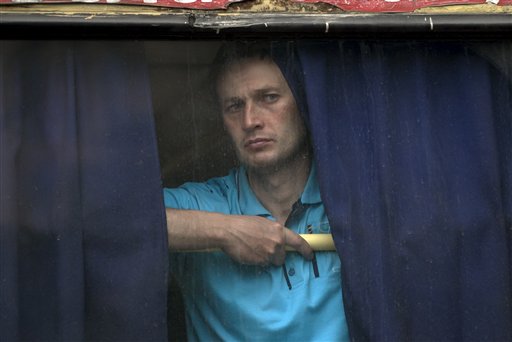Key facts about Ukraine, a country on the brink

A man looks out of the back window of a bus in Donetsk, Ukraine, Monday May 19, 2014. Ukraine will hold presidential elections on May 25. (AP Photo/Vadim Ghirda)
KIEV — Here are key facts about the former Soviet republic of Ukraine, which goes to the polls on Sunday in the grip of its worst crisis since independence almost a quarter of a century ago.
There are fears Ukraine could collapse after its former masters in Moscow annexed Crimea in March and pro-Russian rebels launched an uprising in the east against Kiev’s interim rulers the following month.
The latest crisis first erupted six months ago when the pro-EU opposition began protests in Kiev against Kremlin-backed president Viktor Yanukovych.
Political situation
A 2004 election pitted pro-Western politician Viktor Yushchenko against Yanukovych. After official results showed Yanukovych had won, Yushchenko launched mass protests, claiming the election was rigged.
Article continues after this advertisementThe supreme court ordered a re-run in December 2004 which Yushchenko won in what became known as the Orange Revolution.
Article continues after this advertisementBut there was widespread disappointment with Yushchenko’s failure to bring real change, and he failed to make it through the first round of the next election in 2010.
Yanukovych went on to win against then-prime minister Yulia Tymoshenko, the heroine of the Orange Revolution.
She was later sentenced to seven years in prison for abuse of power in a case she says was politically motivated.
In November 2013, the pro-West opposition, angry at Ukraine’s decision to suspend EU partnership talks, launched a mass protest movement which culminated in February 2014 with the ouster of Yanukovych.
As the president fled, Tymoshenko walked free and her right-hand man Oleksandr Turchynov was designated interim leader ahead of a presidential election set for May 25.
Economy
Ukraine was teetering on the brink of bankruptcy after Moscow cancelled a $15-billion (11-billion-euro) bailout and a deal for cut-price gas following Yanukovych’s overthrow.
The IMF in April 2014 approved a $17 billion (12 billion euro) aid package, part of a wider $27 billion (20 billion euro) deal also involving loans from the World Bank and European Union.
The European Bank for Reconstruction and Development said earlier this month it expects Ukraine to tumble into recession in 2014 with its economy shrinking 7.0 percent. The IMF meanwhile has forecast the economy to decline by 5.0 percent with unemployment at 8.0 percent in 2013-14.
The IMF has not said what it would do if the country breaks up.
The eastern provinces of Donetsk and Lugansk, where pro-Russian insurgents have declared independent republics, as well as Kharkiv, account for over 21 percent of national economic output and 30 percent of industrial production, the IMF says.
Gas is a major bone of contention with Russia, which provides 60 percent of Ukraine’s needs.
Nearly 15 percent of all gas consumed in Europe is also delivered from Russia via the former Soviet republic. Russia has threatened to halt the flow of gas to Ukraine if it fails to pay a bill by early June.
History
Much of modern-day Ukraine was part of the former Russian empire although its northwest belonged to the Austro-Hungarian empire. After the Russian revolution, Ukraine became part of the USSR.
Growing opposition to Soviet rule culminated in the declaration of independence on August 24, 1991, confirmed by referendum on December 1.
The world’s worst civilian nuclear accident took place in Ukraine on April 26, 1986, at the Chernobyl nuclear power station. Thirty people were killed in an explosion and a further 2,500 died of related illnesses. The reactor was closed in 2000.
Other facts and figures
Geography: Ukraine lies in eastern Europe sandwiched between ex-Soviet Belarus, Moldova and Russia and EU members Hungary, Poland, Romania and Slovakia.
It covers 603,700 square kilometers (241,500 square miles) and is the second largest country in Europe after Russia.
Population: 45.6 million in 2012 (World Bank). Russians make up the largest minority.
Defense: Around 130,000 active personnel plus 85,000 paramilitary (IISS 2014)
Religion: Overwhelmingly Christian, with about two thirds Orthodox
Currency: The hryvnia
RELATED STORIES
UN Security Council holds 3rd emergency meeting on Ukraine